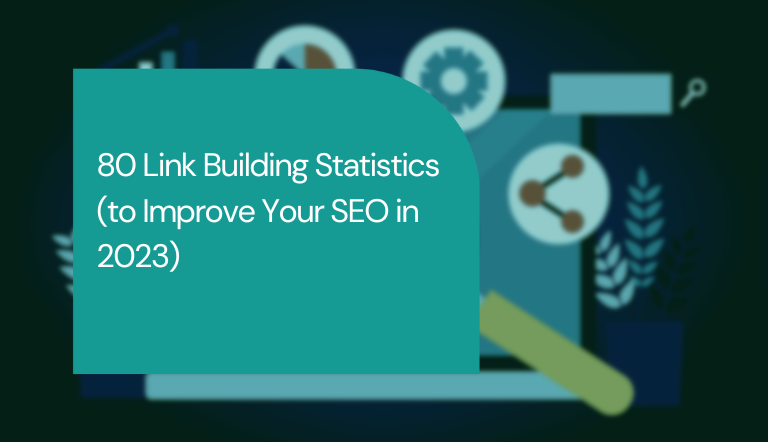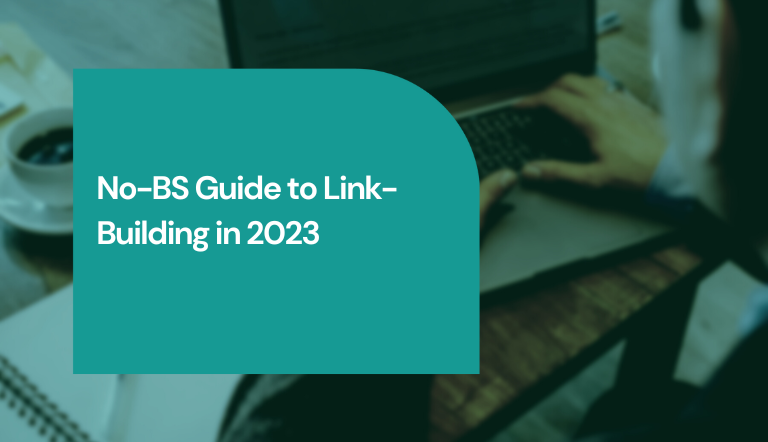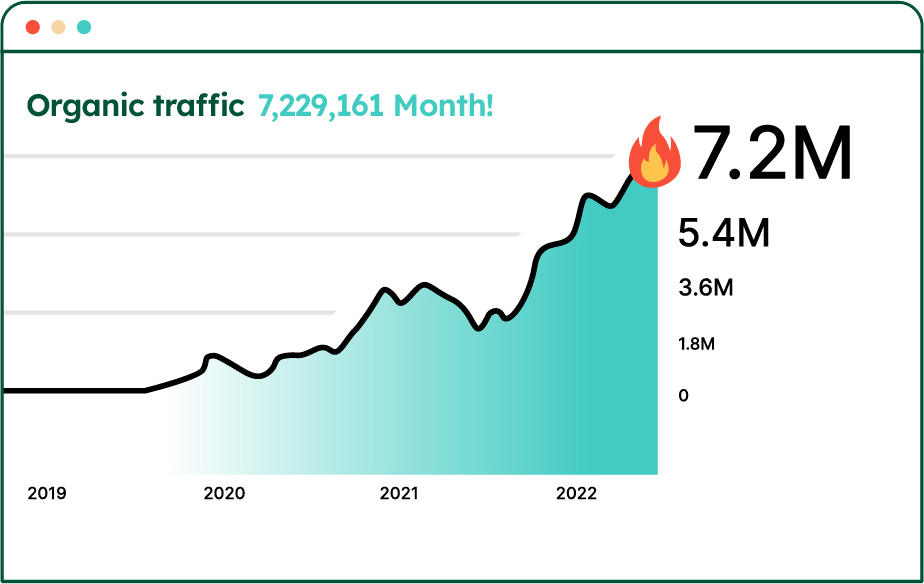Link building is like the cardio of Search Engine Optimization (SEO) – it’s not the most glamorous part of the game, it can be tough, and – let’s be honest – there are other things you’d rather be doing.
But just like with cardio, if you want to build (SEO) endurance and boost your performance, you have to do it. Without link building, your website risks lagging behind competitors in search results and missing out on valuable organic traffic.
That said, choosing the right link-building strategy can be tricky, especially since search engines keep changing the rules of the game.
That’s why we’ve compiled this comprehensive list of over 80 link-building statistics to help you understand how link-building affects SEO and how you can take advantage of it.
So, let’s dive in and get your website’s heart pumping with some link-building cardio.
10 Key Link Building Statistics
Link building is a vital part of SEO because it helps search engines recognize the quality of your content, resulting in better ranking. However, with so many strategies and tactics available, it can be confusing to determine where to put your efforts.
Here are ten key link-building statistics that can help you gain a better understanding of today’s digital landscape, and make more informed decisions about your link-building approach.
- According to a Google senior strategist, links are one of the three most important factors for ranking on Google. The same goes for other search engines.
- 93.8% of link-building experts agree that link quality is more impactful than link quantity, according to Authority Hacker.
- However, link quantity is still important. In fact, pages that rank first on Google search results have 3.8 times more backlinks than those in positions 2-10, according to Backlinko.
- 58.1% of business owners feel link building significantly impacts search engine rankings, while 37.3% believe the effects to be moderate, according to uSERP.
- Building quality links takes time. Authority Hacker reveals that 73.5% of link builders acquire 10 or fewer links each month.
- Backlinks have more power when they come from different domains. That means that getting five links from five websites is (usually) better than getting five links from one website. Backlinko reports that the first result in Google search has 3.2 times more referring domains than the other results on the first page.
- If they had to choose only one metric to acquire backlinks, 34% of marketers would look at domain authority, according to Moz. This unique metric measures how successful a website is in ranking for search engine results.
- According to a survey by Ascend2 in partnership with Conductor, 13% of SEO experts believe link building to be the most valuable tool for boosting SEO.
- According to an Ahrefs study, the amount of traffic a web page receives is directly linked to how many backlinks link to that page.
- Content Marketing Research survey reveals that 70% of SEO experts believe creating unique research and data content is the best way to attract backlinks.
10 General Link Building Statistics
Link building is a powerful tool that can improve your website’s ranking and authority. However, only a small percentage of business owners understand its importance.
Here are some crucial statistics that can help you discover the current trends of link building:
- Most websites fail to use the power of backlinks to improve their ranking. In fact, Backlinko reports that 95% of all pages have zero backlinks.
- However, that number can vary depending on the source. According to Ahrefs, around two-thirds of pages have zero backlinks.
- According to Authority Hacker, almost 80% of SEO experts agree that link-building is vital to any SEO strategy.
- Getting backlinks from different domains is important for ranking. However, a Backlinko and BuzzSumo content study reveals that only 2.2% of content has backlinks from multiple websites.
- Ahrefs reports that 73.6% of websites have reciprocal links. That means that when a website links to another domain, they also receive a link back in return.
- According to the same report, that number goes down to 43.7% for top-ranking pages.
- 65% of SEO experts see domain rating or domain authority as the most important metric when searching for quality backlinks, according to uSERP.
- A HubSpot survey reveals that websites with blogs get 97% more links and 55% more visitors.
- 60% of bloggers publish 1-5 blog posts each month to acquire more backlinks.
- Most digital marketers run a 4-week link-building campaign after creating a new piece of content, according to Ranktracker.
11 Statistics About the Impact of Link Building
Acquiring backlinks is like building a network of high-quality digital connections – the more reputable and trustworthy websites link to you, the more search engines trust you.
It’s like getting a thumbs up from a respected professional in your field – people instantly look at you differently.
Here are some statistics about how link building can help your business:
- An Aira survey discovered that 69% of marketing professionals believe that buying links can improve your website’s rankings.
- According to Authority Hacker, 78.1% of SEO experts are satisfied with their link-building efforts, gaining a positive Return On Investment (ROI).
- It takes 3.1 months on average to see the impact of link building on search engine rankings, according to Authority Hacker.
- This agrees with the general expert consensus that it takes anywhere from one to six months for links to boost your website ranking.
- Ahrefs discloses that 10.6% of all backlinks to top websites are no-follow. That means they shouldn’t affect search engine rankings.
- However, Google has recently evolved the “no-follow” attribute, and as much as 89.1% of link builders believe that no-follow links contribute to better rankings, according to Authority Hacker.
- According to a uSERP survey, 84.4% of marketers believe link-building can help brands improve authority.
- According to a search traffic study by Ahrefs, only around 5% of web pages without any backlinks get organic traffic. And most of these pages get under 300 visits each month.
- Backlinks with relevant anchor text are more effective and have a bigger impact, according to Ahrefs.
- Backlinko reports that having a good backlink profile helps improve your website’s ranking for voice search.
- An average link-building campaign produces 1-9 links, according to a survey by Aira.
11 Statistics on Link-Building Tactics
Choosing the right link-building strategies is crucial, considering that not all backlinks are created equal.
As a rule of thumb, high-quality links from reputable websites will have a much larger impact on your authority and SEO, but acquiring them isn’t easy.
That’s why we’ve compiled this list of statistics to help you figure out which link-building tactics work and which don’t:
- According to uSERP, 4 out of 10 marketers believe generating quality content is a better way to acquire backlinks compared to an active link-building strategy.
- Creating a content strategy to get links is the best link-building tactic, according to Aira. It is almost 80% more effective than guest posting.
- Cold outreach emailing may not be the best approach for link building. A Backlinko outreach study reveals that this tactic produces results in only 8.5% of cases.
- Hiring someone experienced to handle link building is vital. That’s because they can acquire 3,57 more links than beginners, according to Authority Hacker.
- Guest posting is still relevant. Authority Hacker’s survey discovered that 64.9% of link builders use guest posting, making it the most popular strategy.
- In fact, 53% of digital marketers think guest posting is still the best link-building strategy, according to a survey by SEMrush.
- Swapping links is a common tactic by link builders, as 51.6% participate in link exchanges.
- Digital PR is the least common link-building strategy, as only 17.7% of link builders claim to use it. However, that number goes up significantly for expert link builders.
- According to Aira, 36% of websites hire freelancers and link-building agencies to assist them in their link-building efforts.
- According to a Databox survey, 80% of link builders use Ahrefs for their campaigns. Other popular tools include SEMrush and Moz.
- Videos can be an effective strategy for acquiring backlinks, according to the Content Marketing Institute. Their survey uncovered that 59% of SEO experts used videos to get backlinks, and two-thirds were satisfied with the results.
Want to improve your process of building quality backlinks? Discover our best tips on how to ask for backlinks.
11 Link Building Pricing & Costs Statistics
Google and other search engines want you to build your backlinks “naturally,” which is why they discourage paying for links.
However, most SEO experts still continue to pay for links to build their search engine rankings. Here are some link-building pricing and cost statistics to help you discover just how much money you need to invest in a good link-building strategy:
- Paying for links is a common practice in the industry, as Authority Hacker reports that 74.3% of link-building experts pay for links.
- 38.4% of businesses spend between $1000 and $5000 on link building each month, according to uSERP.
- According to Authority Hacker’s survey, it costs $83 on average to acquire a paid link. However, the exact price depends on factors such as niche, industry, domain ranking, and more.
- Buying a backlink can be costly, as Ahrefs reports that the average price is $361.44. Many link-building experts agree that you need to pay over $1,000 to acquire a quality backlink for your website.
- However, Authority Hacker also reveals that paying for links only adds two more links each month, compared to those who take a non-paying approach.
- Almost half (46%) of marketers spend more than $10,000 per year on link building, according to a survey conducted by Aira.
- Most SEO experts allocate almost one-third of their budget (28%) for link building, according to Authority Hacker.
- The same study reveals that 61.7% of SEO experts think link building is becoming more expensive and 52.7% believe it takes more time.
- Experienced link builders manage to acquire backlinks for 41% less money compared to beginners, according to Authority Hacker.
- SEO Tribunal reveals that brands can spend as much as 25% of their digital marketing budget on building links.
- And 61% of digital marketers spend up to 10% of their budget on link-building campaigns.
Are you looking to outsource your link-building efforts? Check out our white hat link-building services!
8 Statistics About Link Building and Social Media
Many link builders use social media to outreach and acquire backlinks. Social media networks are also a great place to share your content, get more traction, and have people link to that content.
The following statistics will help you understand the relationship between link building and social media and how you can use it to your advantage:
- According to a content study by Backlinko and BuzzSumo, 94% of online content gets zero social media shares and backlinks.
- The same survey uncovered that a small percentage of articles generate the most traction on social media. Only 1.3% of blog posts get 75% of social media shares.
- Social media is a great way to do outreach and acquire backlinks. Authority Hacker discovers that using these mediums helps link builders gain 22% more links.
- In addition, this survey reveals that 61.7% of link builders use social media for outreach.
- Facebook seems to be the most interesting social media network for link builders, as 23.5% use it to find contact information and do outreach.
- In comparison, only 17.3% use LinkedIn for the same purpose.
- Authority Hacker also reveals that content that’s popular on social media receives 2-5 times more backlinks.
- However, content with more links doesn’t necessarily receive more social media shares, according to Backlinko. Their survey found no correlation between the two metrics.
9 Link Building Trends
If you want to be successful in link building, you need to get familiar with current and future trends. This will help you determine the best strategy to build authority and ensure long-term SEO success.
Here are some link-building trends to watch out for:
- Almost 90% of companies run regular link-building campaigns, according to a survey by Databox.
- Authority Hacker reveals that 65.2% of experts believe that in five years, link building will have the same or higher impact on search engine rankings.
- The same survey shows that SEO experts believe that link building is here to stay, as 80% think backlinks will still be important for ranking in 10 years.
- Only 1.2% of SEO professionals believe links will have no impact in as little as five years.
- However, in a recent live Q&A with Google representatives, we learned that backlinks don’t have as big of an impact as they once had. In addition, John Mueller stated that they would probably have a less significant role in the future.
- According to an Aira survey, 42% of SEO experts recognize the importance of internal links, which is why they spend the same amount of time building them as external links.
- SEMrush reports that most business owners prefer to leave link building to professionals. That’s why as many as 64% decide to outsource their link-building efforts.
- However, that may be about to change as an Aira survey revealed that more companies are switching to in-house link building. 64% of their respondents didn’t use external help to acquire backlinks.
- As link building is becoming more competitive, 41% of experts expect the costs to go up in the near future.
10 Link Building Challenges & Opportunities
Link building is often more difficult than it looks.
Creating valuable content, finding reliable websites for backlinks, and reaching out to them successfully, is challenging. That’s why we’ve created this list of the most important link-building challenges and opportunities you need to know if you want to succeed.
- 41% of big organizations describe link building as the most challenging part of their SEO efforts, according to Conductor.
- In fact, 28% of digital marketers report running link-building campaigns that resulted in zero backlinks, according to a survey by Aira. This number highlights how challenging link building can be.
- Long-form content is the best option for acquiring backlinks. According to a content study by Backlinko and BuzzSumo, long-form articles get 77.2% more links than short ones.
- According to a Serpstat survey, 20.1% of professionals rated science or technology as the most difficult areas for link building.
- Aira reveals that 89% of marketers create content to attract backlinks. If you are one of them, keep in mind that infographics, skyscraper posts, and listicles attract the most links.
- Getting backlinks for certain types of content may be easier. For example, a content study by Backlinko and BuzzSumo revealed that infographics, “What” posts and “Why” posts received 25.8% more backlinks than “How-to” posts and videos.
- According to the Content Marketing Institute, 53% of SEO experts create infographics to attract new links, and 61% find the strategy effective.
- Content Marketing Institute also reveals that webinars are an ineffective approach to link building, as only 56% of marketers report having mild success with them.
- Internal link building is another important opportunity to improve your search engine ranking. According to 51% of SEO experts, you should incorporate at least 2-3 internal links in your blog post.
- Although a study by Backlinko revealed that cold email outreach might not be the best option for link building, the same research discovered that sending a follow-up email can double your chances at success.
If you are not a fan of link building, read our guide on how to rank without backlinks.
Is Link Building Still Important for SEO?
The impact of link building is often put into question, although it remains one of the most important components of SEO. So, with all the advanced algorithms and artificial intelligence gaining popularity by the day, you may wonder if link building is still important for SEO in 2023.
The answer is – absolutely!
Here’s why…
Search engines need a reliable way to determine whether your content is relevant and authoritative. And backlinks remain one of the best metrics for that, along with content quality and user experience.
When a reputable website links to your content, Google and other search engines see it as a vote of confidence and trust. Think of it like being endorsed by a celebrity or an authoritative figure in your industry – it makes you more credible in the eyes of the public.
However, Google and other search engines often update their policies and guidelines regarding how you can acquire links. That’s why link builders and business owners need to stay informed about the latest changes to avoid upsetting search engine overlords.
Not to mention, search engines have become smarter in recent years, and can easily distinguish between high-quality and spammy links. So, a few relevant, quality backlinks may have a bigger impact on your search engine rankings than dozens of low-quality links from questionable websites with poor domain authority or backlink farms.
Just like you wouldn’t want to build a relationship with questionable people or businesses in your personal or professional life, you don’t want your website to receive a link from a domain with a bad reputation.
Lastly, link building can increase organic traffic to your website and help you connect to other websites in your niche to create a sense of community. In either case, link building done right can definitely be a huge plus for your SEO.
Conclusion
That concludes our comprehensive list of the most important link-building statistics you need to know to boost SEO in 2023.
We hope these 80 statistics have helped you understand the importance of link-building and identify the best strategies to improve your SEO game.
Because one thing is certain – link building is here to stay.
For more advice on SEO and current trends, check out our blog!





